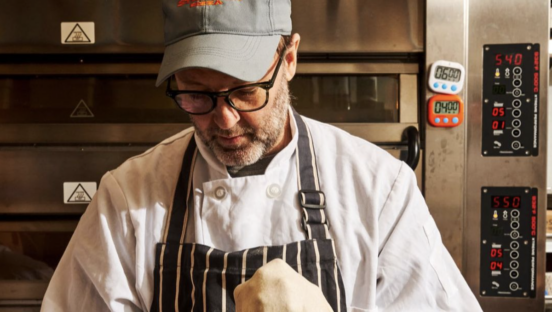Vincenzo Esposito, the pizzaiolo behind Naples’ famous Carmnella, often describes his pies as “Troppo Napoletana”—translated as “too Neapolitan” or, if you prefer, “very Neapolitan.” We’ll go with the latter, because, when it comes to pizza, can there be such a thing as “too Neapolitan”?
Doubtful. And Esposito’s family has a stellar track record in pizza dating back to 1892, when his great-grandmother, Carmela Sorrentino—nicknamed Carmnella—started serving Neapolitan cuisine and fried pizzas in the bustling neighborhood of Borgo Sant’Antonio Abate. Over the years, she remarried and moved to different neighborhoods not once or twice but thrice—and she opened new pizzerias everywhere she went.
Since then, many of Sorrentino’s descendants have continued working in the pizza business, and Esposito himself also honed his skills at Pizzeria Trianon, another legendary Naples eatery.
Related: Italian experts: These are the world’s best pizzerias for 2023
Today, Carmnella, which Esposito and his father opened in 1996 in the Case Nuove district, is the pizzeria of choice for “locals in the know,” reports Culinary Backstreets. And Esposito is there every day, sometimes making pizza, sometimes cashing out guests or even greeting them at the door, but mostly supervising his staff and running the show with an ever-present dimpled smile.
But whatever you do, Esposito told Culinary Backstreets, “Please don’t call me maestro. I don’t teach anyone. Teachers are in school, and I believe that pizzaioli that refer to themselves as [maestro] actually have nothing to teach.” Which is odd because, as Culinary Backstreets notes, Esposito does, indeed, teach pizza-making classes. But, hey, never mind that. The man’s humble.
Esposito grew up in his family’s restaurant and fell in love with pizza early on—even though his father hoped he’d choose a less demanding career. Once it was clear Esposito’s mind was made up, his dad sent him to learn the craft at other pizzerias before father and son reunited to join forces on Carmnella.
In a recent interview with the Italian website, Fermento Pizza, Esposito said his dough is “a simple thing made up of only four genuine ingredients: water, flour, salt and yeast, along with a lot of passion and professionalism. To this, you add the identity and flavor aspects you want to give to the pizza.”
He added, “My goal every day is to create a pizza that has two fundamental characteristics: crispiness and melt-in-the-mouth texture.”
The Italian pizza guide 50 Top Pizza recently recognized Carmnella with its Pizzerie Excellenti award for the second year in a row, noting, “Their work with various types of Campanian tomatoes on a light and well-leavened dough is interesting.” Which seems like a bit of an understatement because what Esposito dearly loves, in fact, is creating different types of Margherita pizzas with different varieties of tomatoes: datterino (a type of cherry tomato), lampadina (a tomato shaped like a light bulb), fiascone (a large, ribbed, beefsteak-type tomato) and pienollo del Vesuvia (grown where tomatoes grow best—in Campania near Mount Vesuvius).
Related: Pizza maker of the year: The secret is seasonal ingredients
He believes fior di latte from Agerola is “essential” to a high-quality Margherita pizza. And, he added in the Fermento Pizza interview, “When it comes to Margherita, it’s obligatory to add a sprinkle of Pecorino Romano, plenty of basil and high-quality Italian extra virgin olive oil.”
He’s especially proud of his Elena Ferrante pizza, which, he said, has been “loved and sought after by numerous customers over the years. It is filled with slow-cooked Neapolitan ragù, ricotta cheese, Agerola fior di latte, meatballs, cheese, curly Neapolitan basil, extra virgin olive oil and Rimbas pepper.”
But, as Esposito told Fermento Pizza, the Margherita and the Marinara “are the pizzas that perfectly represent the concept of innovation. Innovation is creating a Marinara that is different from the classic one without distorting it. Thus, my Marinara, Marinara with salami and Marinaresca pizzas were born. These pizzas embody my vision of pizza and the art that distinguishes it in its many forms.”
So is there any chance that Esposito will bring the Carmnella concept to the United States? Probably not, he told Culinary Backstreets. “More than once, some American entrepreneur has asked me to open restaurants in their country,” he said. “The issue is that they don’t want my brand—they want me to lead their kitchen there. To that, I always answer, ‘I’m flattered, but I already have a business to attend to.’ This is my land, my roots are here. It’s here where I have to be.”













